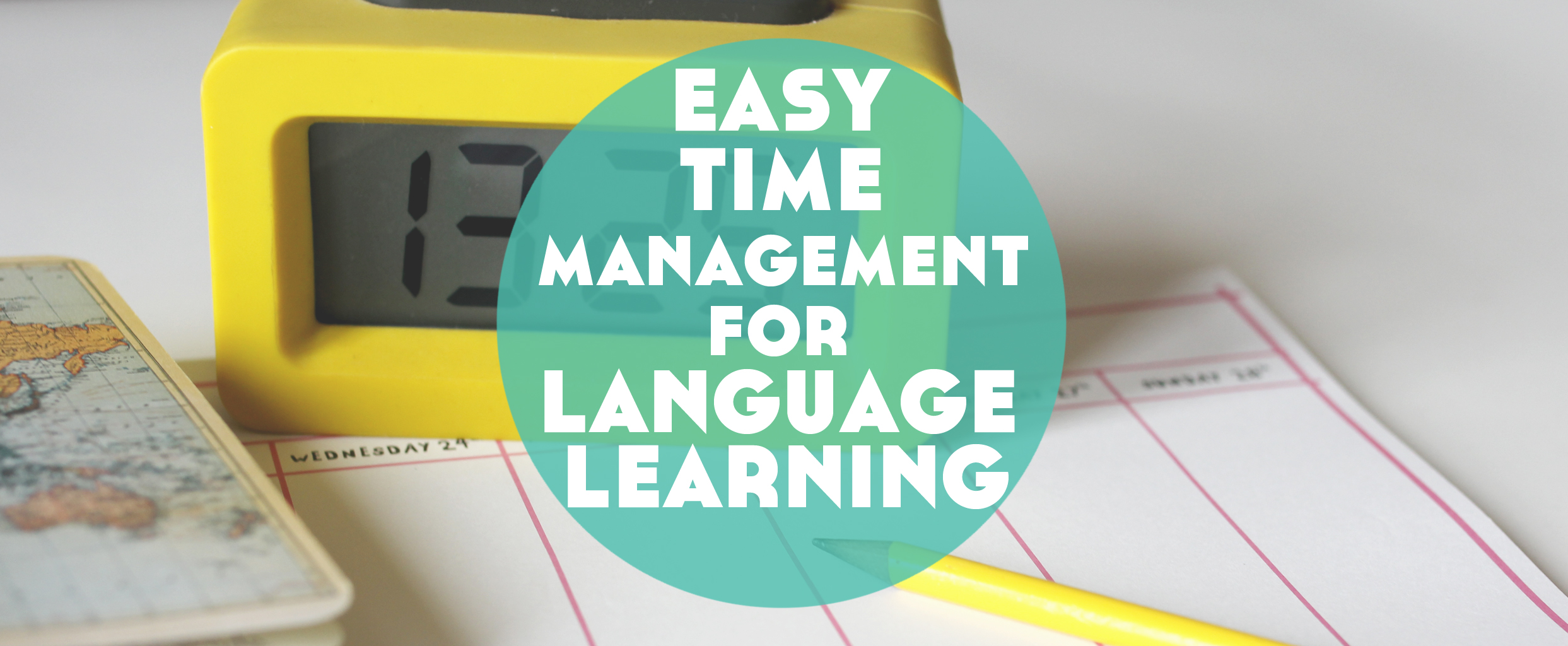January 25th, 2016
The Simple No-Tech Habit I Use Every Week for Better Time Management for Language Learning
We all want to manage our time more efficiently, and when it comes to language learning it’s a pretty useful skill to develop to propel us towards pro status.
However, sometimes it feels like getting started with the numerous apps and programs promising to manage our time is wasting more time than it’s managing.
I love a fancy app with a pretty interface and promises of productivity as much as the next person but I think it’s time we take things back to basics, don’t you?

Step 1 – Figuring Out How Much Time You Have
Think about your average day or week. When do you find yourself “killing time” scrolling through cat videos or twiddling your thumbs?
That’s the time we’re looking for. We’re going to use it.
Or maybe you already have some time carved out of your day for language learning but it’s just not happening as you plan. We’ll fix that too.
Personally, that’s me right now.
I set myself an hour each morning from 7-8am for language learning but lately I’ve been noticing that between 8am and starting work, I’m dawdling. Hesitant to start work for fear of overworking yet feeling like I’ve done my study time for the day.
That’s my time struggle right now. That’s the hour of my day I’m going to use as an example for this post.
But for you it might be totally different.
You might find yourself with 5-minute thumb-twiddling sessions throughout the day, you might find yourself with 3 back-to-back days followed by a completely free day for language learning.
Like I said, it’s all you.
There’s no right or wrong pattern here. You have to decide when you can squeeze in a little language.
Related: Nailing Time Management
Step 2 – Figuring Out The Best Way to Fill It
Now you know when you’re going to be able to fit language learning into your life, you can start to plan ahead and set yourself some daily tasks for your language learning.
I don’t know about you, but for me, f it ain’t on the list, chances are it ain’t gettin’ done.
From assessing my habits, I’ve realised that I find myself feeling guilty when I waste the hour from 8am to 9am, but I don’t feel as bad on a Friday.
I guess just because it is what it is: Friday.
So I won’t plan too hard for Friday mornings. And I won’t feel bad about it because hey, that’s my day. I stand by you, Rebecca Black.
Yours will be completely different and that’s ok. In fact, that’s better than ok, that’s perfect.
What do you fill it with?
As you saw in my example above, I have some tasks that are set to do daily and others that float and aren’t as regular.
The thing about language learning is that routine and habit are one thing but mixing it up and keeping things fresh also play a key role in successful self-study.
Decide what you can (and want to) do daily and add those to your planner.
Examples here might be Memrise, Duolingo, a chapter from your course, 10 minutes on HelloTalk, a YouTube video…the list goes on.
Next, think about things you can do less regularly that will still keep your language learning buzzing.
This could be something such as a longer writing task you set yourself, translating an article or a song, or an italki lesson…Again, by no means a complete list here.
Don’t be afraid to experiment with different things each week.
Step 3 – Doing it.
Because planning alone won’t get you speaking that language.
But this isn’t just a lazy step I’ve added here. It’s actually important to do what you’ve set out to for two main reasons.
Number one: you want to learn that language. This is the step that’s going to actively help you with that.
Number two: if you find yourself not doing it, then something’s wrong and it’s time to move on to step 4 and decide what that something is.
Step 4 – Self-Review
As D:Ream reminded us in the nineties, Things Can Only Get Better. Regardless of how well you managed your time during the first week of using the planner, there’s always something to improve on.
Be honest with yourself and tick things off throughout the week as you do them.
If you don’t do them, decide why they didn’t happen and if it was boring, uninspiring or too much, don’t try and force them the next week.
This week, I’ve planned to do some fun things in my 8-9am slot. I’m going to spend some extra time with fun Hangul activities, find some songs to listen to, and practise my writing. Woop!
I’ll review it again on the weekend and the cycle begins again. Only this time, it’s slightly improved on last week’s plan.
So each week, from some simple time management, my language learning routine gets a little bit better. Lovely.
Related: 10 Things I Did Differently for Language Learning in 2015







